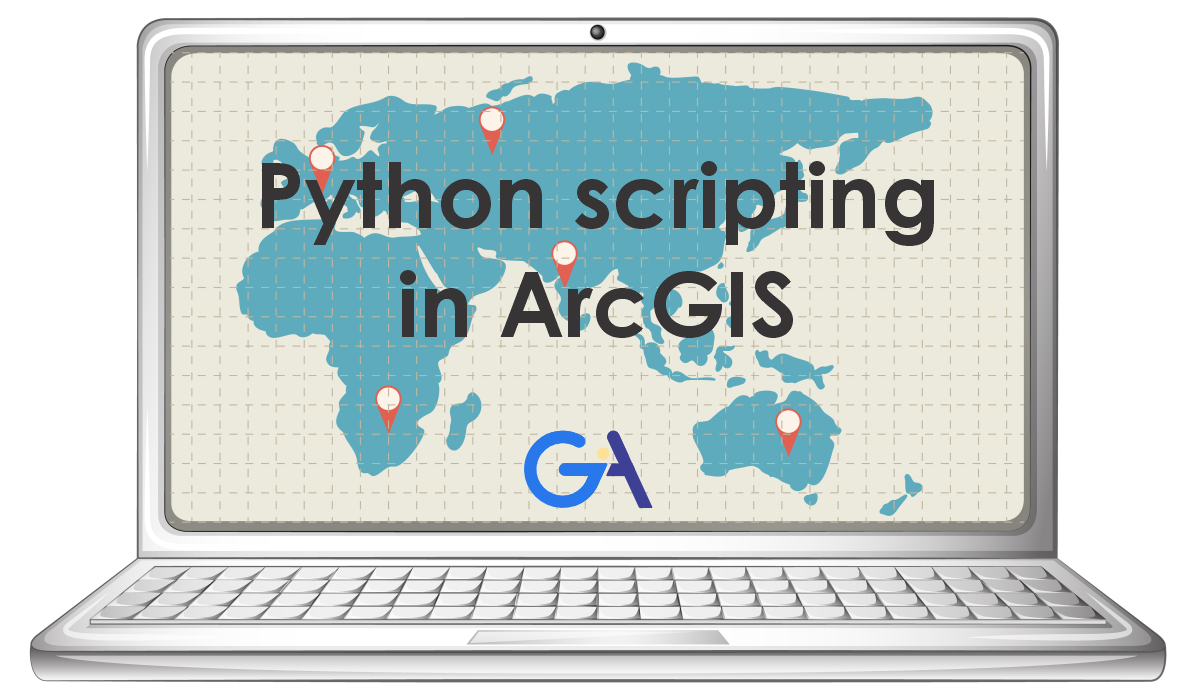
Python Scripting for ArcGIS: Complete Developer Guide
Python scripting in ArcGIS transforms repetitive GIS workflows into automated, efficient processes. Whether you’re managing datasets, performing complex spatial analysis, or building custom geoprocessing tools, Python with ArcPy provides the foundation for professional GIS automation.
What is ArcPy?
ArcPy is Esri’s comprehensive Python site package that serves as your gateway to ArcGIS functionality. It provides programmatic access to:
- Geoprocessing Tools: Over 800 analysis, conversion, and data management tools
- Map Documents: Manipulate layers, symbology, and layout elements
- Data Management: Create, modify, and query geodatabases and feature classes
- Spatial Analysis: Perform complex geospatial calculations and modeling
Where to Execute Python Scripts
1. ArcGIS Pro Python Window
- Best for: Quick commands, testing snippets, interactive exploration
- Access: Analysis ribbon → Python button
2. Standalone Python Scripts (.py files)
- Best for: Complex automation, scheduled tasks, reusable tools
- Environment: Use ArcGIS Pro’s Conda environment
3. ModelBuilder Integration
- Best for: Hybrid visual/code workflows
- Implementation: Python Script Tool within models
4. Jupyter Notebooks
- Best for: Data exploration, documentation, sharing workflows
- Included with ArcGIS Pro installation
Core Capabilities
Automation & Batch Processing
- Eliminate repetitive manual tasks
- Process hundreds of datasets with single script execution
- Schedule automated workflows for regular data updates
Custom Analysis Workflows
- Chain multiple geoprocessing operations
- Implement complex spatial analysis algorithms
- Build decision-making logic into processing workflows
Data Management & Conversion
- Migrate data between formats (Shapefile, geodatabase, CAD, etc.)
- Standardize attribute schemas across datasets
- Validate and clean spatial data programmatically
Advanced Integration
- Connect to external databases and web services
- Integrate with other Python libraries (pandas, numpy, requests)
- Build standalone geoprocessing tools with custom interfaces
Essential Script Structure
import arcpy
import os
from datetime import datetime
# Configure environment settings
arcpy.env.workspace = r"C:\GIS_Projects\MyProject\Geodatabase.gdb"
arcpy.env.overwriteOutput = True # Allow overwriting existing outputs
arcpy.env.outputCoordinateSystem = arcpy.SpatialReference(4326) # WGS84
try:
# Main processing logic
input_fc = "Parks"
output_fc = "Buffered_Parks"
buffer_distance = "500 Meters"
# Execute geoprocessing
result = arcpy.Buffer_analysis(input_fc, output_fc, buffer_distance)
# Log success
print(f"Buffer analysis completed successfully: {result.getOutput(0)}")
except arcpy.ExecuteError as e:
# Handle geoprocessing errors
print(f"Geoprocessing error: {arcpy.GetMessages(2)}")
except Exception as e:
# Handle general errors
print(f"General error: {str(e)}")
finally:
# Cleanup (if needed)
print("Script execution completed.")
Core ArcPy Functional Areas
| Category | Function | Purpose | Example Usage |
|---|---|---|---|
| Environment | arcpy.env | Configure processing settings | arcpy.env.workspace = r"C:\Data" |
| Data Discovery | arcpy.List*() | Find available datasets | arcpy.ListFeatureClasses("*_roads") |
| Geoprocessing | Tool functions | Perform spatial analysis | arcpy.Buffer_analysis(input, output, "1000 Meters") |
| Data Inspection | arcpy.Describe() | Get dataset properties | desc = arcpy.Describe("parcels.shp") |
| Attribute Operations | arcpy.da cursors | Read/write attribute data | arcpy.da.UpdateCursor(fc, ["FIELD1", "FIELD2"]) |
| Spatial Analysis | arcpy.sa | Raster and vector analysis | arcpy.sa.Slope("elevation_dem") |
| Raster Processing | arcpy.Raster() | Manipulate raster datasets | elevation = arcpy.Raster("dem.tif") |
Practical Examples
Example 1: Intelligent Batch Processing
import arcpy
import os
from pathlib import Path
def batch_buffer_with_validation(workspace, output_folder, buffer_distance="300 Meters"):
"""
Buffer all feature classes in workspace with validation and error handling.
"""
arcpy.env.workspace = workspace
# Create output folder if it doesn't exist
Path(output_folder).mkdir(parents=True, exist_ok=True)
# Get list of feature classes
feature_classes = arcpy.ListFeatureClasses()
if not feature_classes:
print("No feature classes found in workspace.")
return
results = {"success": [], "failed": []}
for fc in feature_classes:
try:
# Validate geometry before processing
desc = arcpy.Describe(fc)
if desc.shapeType not in ["Point", "Polyline", "Polygon"]:
print(f"Skipping {fc}: Unsupported geometry type")
continue
# Check if feature class has features
count = arcpy.GetCount_management(fc).getOutput(0)
if int(count) == 0:
print(f"Skipping {fc}: No features found")
continue
# Create output path
output_fc = os.path.join(output_folder, f"{fc}_buffered.shp")
# Perform buffer operation
arcpy.Buffer_analysis(fc, output_fc, buffer_distance)
results["success"].append(fc)
print(f"✓ Successfully buffered {fc} ({count} features)")
except Exception as e:
results["failed"].append((fc, str(e)))
print(f"✗ Failed to buffer {fc}: {str(e)}")
# Summary report
print(f"\nProcessing complete:")
print(f"Successful: {len(results['success'])}")
print(f"Failed: {len(results['failed'])}")
return results
# Usage
workspace = r"C:\GIS_Projects\Data"
output_folder = r"C:\GIS_Projects\Buffered"
batch_buffer_with_validation(workspace, output_folder)
Example 2: Advanced Attribute Operations
import arcpy
from datetime import datetime
def update_attributes_with_calculations(feature_class, field_mappings):
"""
Update multiple fields with calculated values using cursors.
Args:
feature_class: Path to feature class
field_mappings: Dict of {field_name: calculation_function}
"""
fields = list(field_mappings.keys()) + ["SHAPE@AREA", "OBJECTID"]
with arcpy.da.UpdateCursor(feature_class, fields) as cursor:
for row in cursor:
# Create a row dictionary for easier access
row_dict = {field: row[i] for i, field in enumerate(fields)}
# Apply calculations
for field_name, calc_func in field_mappings.items():
try:
new_value = calc_func(row_dict)
field_index = fields.index(field_name)
row[field_index] = new_value
except Exception as e:
print(f"Error calculating {field_name} for OBJECTID {row_dict['OBJECTID']}: {e}")
continue
cursor.updateRow(row)
# Example usage with custom calculations
def calculate_density(row_data):
"""Calculate population density per square kilometer."""
area_sqkm = row_data["SHAPE@AREA"] / 1000000 # Convert to sq km
population = row_data.get("POPULATION", 0)
return population / area_sqkm if area_sqkm > 0 else 0
def calculate_category(row_data):
"""Categorize based on area."""
area = row_data["SHAPE@AREA"]
if area < 1000:
return "Small"
elif area < 10000:
return "Medium"
else:
return "Large"
# Field mappings
calculations = {
"DENSITY": calculate_density,
"SIZE_CATEGORY": calculate_category,
"LAST_UPDATED": lambda x: datetime.now().strftime("%Y-%m-%d")
}
# Execute updates
update_attributes_with_calculations("Parcels", calculations)
Example 3: Multi-Dataset Spatial Analysis
import arcpy
import os
def perform_proximity_analysis(points_fc, boundary_fc, output_gdb):
"""
Comprehensive proximity analysis workflow.
"""
# Ensure Spatial Analyst extension
if arcpy.CheckExtension("Spatial") == "Available":
arcpy.CheckOutExtension("Spatial")
else:
raise Exception("Spatial Analyst extension not available")
try:
# Set processing environment
arcpy.env.workspace = output_gdb
arcpy.env.extent = boundary_fc
arcpy.env.mask = boundary_fc
# Step 1: Create Euclidean distance raster
print("Calculating Euclidean distance...")
distance_raster = arcpy.sa.EucDistance(points_fc, cell_size=100)
distance_output = os.path.join(output_gdb, "euclidean_distance")
distance_raster.save(distance_output)
# Step 2: Create proximity zones
print("Creating proximity zones...")
zone_breaks = [500, 1000, 2000, 5000] # meters
reclassify_ranges = []
for i, break_val in enumerate(zone_breaks):
start_val = zone_breaks[i-1] if i > 0 else 0
reclassify_ranges.append([start_val, break_val, i+1])
# Add final range for distances beyond last break
reclassify_ranges.append([zone_breaks[-1], 999999, len(zone_breaks)+1])
proximity_zones = arcpy.sa.Reclassify(distance_raster, "Value",
arcpy.sa.RemapRange(reclassify_ranges))
zones_output = os.path.join(output_gdb, "proximity_zones")
proximity_zones.save(zones_output)
# Step 3: Convert to vector for further analysis
print("Converting to vector...")
zones_vector = os.path.join(output_gdb, "proximity_zones_vector")
arcpy.RasterToPolygon_conversion(proximity_zones, zones_vector,
"NO_SIMPLIFY", "VALUE")
# Step 4: Calculate zone statistics
print("Calculating zone statistics...")
arcpy.AddField_management(zones_vector, "ZONE_DESC", "TEXT", field_length=50)
zone_descriptions = {
1: "Very Close (0-500m)",
2: "Close (500-1000m)",
3: "Moderate (1000-2000m)",
4: "Far (2000-5000m)",
5: "Very Far (>5000m)"
}
with arcpy.da.UpdateCursor(zones_vector, ["gridcode", "ZONE_DESC"]) as cursor:
for row in cursor:
row[1] = zone_descriptions.get(row[0], "Unknown")
cursor.updateRow(row)
print("Proximity analysis completed successfully!")
return zones_vector
except Exception as e:
print(f"Analysis failed: {str(e)}")
raise
finally:
arcpy.CheckInExtension("Spatial")
# Usage
points = "Schools"
boundary = "City_Boundary"
output_gdb = r"C:\Projects\Analysis.gdb"
result = perform_proximity_analysis(points, boundary, output_gdb)
Professional Best Practices
1. Error Handling & Logging
import arcpy
import logging
from datetime import datetime
# Configure logging
logging.basicConfig(
level=logging.INFO,
format='%(asctime)s - %(levelname)s - %(message)s',
handlers=[
logging.FileHandler(f'gis_process_{datetime.now().strftime("%Y%m%d")}.log'),
logging.StreamHandler()
]
)
def safe_geoprocessing(func, *args, **kwargs):
"""Wrapper for safe geoprocessing execution."""
try:
result = func(*args, **kwargs)
logging.info(f"Successfully executed {func.__name__}")
return result
except arcpy.ExecuteError:
logging.error(f"Geoprocessing error in {func.__name__}: {arcpy.GetMessages(2)}")
raise
except Exception as e:
logging.error(f"General error in {func.__name__}: {str(e)}")
raise
2. Performance Optimization
# Use appropriate spatial references
arcpy.env.outputCoordinateSystem = arcpy.SpatialReference("WGS 1984 Web Mercator (auxiliary sphere)")
# Configure processing extent
arcpy.env.extent = "MAXOF" # or specific extent
# Enable parallel processing where available
arcpy.env.parallelProcessingFactor = "75%"
# Use in-memory workspace for temporary data
arcpy.env.scratchWorkspace = "in_memory"
3. Memory Management
# Clean up intermediate datasets
def cleanup_intermediate_data():
"""Remove temporary datasets from memory."""
for dataset in arcpy.ListFeatureClasses("temp_*", workspace="in_memory"):
arcpy.Delete_management(f"in_memory/{dataset}")
for dataset in arcpy.ListRasters("temp_*", workspace="in_memory"):
arcpy.Delete_management(f"in_memory/{dataset}")
# Use context managers for cursors
with arcpy.da.SearchCursor(feature_class, fields) as cursor:
for row in cursor:
# Process row
pass
# Cursor automatically cleaned up
4. Path Management
from pathlib import Path
# Use pathlib for robust path operations
project_root = Path(r"C:\GIS_Projects\MyProject")
data_folder = project_root / "data"
output_folder = project_root / "outputs"
# Ensure directories exist
output_folder.mkdir(parents=True, exist_ok=True)
# Build paths safely
input_fc = str(data_folder / "boundaries.shp")
output_fc = str(output_folder / "processed_boundaries.shp")
Development Environment Setup
1. IDE Configuration
Visual Studio Code with ArcGIS Pro
// settings.json
{
"python.defaultInterpreterPath": "C:\\Program Files\\ArcGIS\\Pro\\bin\\Python\\envs\\arcgispro-py3\\python.exe",
"python.terminal.activateEnvironment": false
}
2. Virtual Environment Management
# Clone ArcGIS Pro environment
conda create --name my-gis-project --clone arcgispro-py3
# Activate environment
conda activate my-gis-project
# Install additional packages
conda install pandas matplotlib seaborn
pip install requests beautifulsoup4
3. Code Organization
# project_structure/
# ├── src/
# │ ├── geoprocessing/
# │ │ ├── __init__.py
# │ │ ├── analysis.py
# │ │ └── data_management.py
# │ ├── utils/
# │ │ ├── __init__.py
# │ │ ├── helpers.py
# │ │ └── validation.py
# │ └── config/
# │ ├── __init__.py
# │ └── settings.py
# ├── data/
# ├── outputs/
# ├── logs/
# └── main.py
Advanced Integration Patterns
Working with External Data Sources
import arcpy
import pandas as pd
import requests
def integrate_external_data(feature_class, api_endpoint, join_field):
"""Integrate external API data with GIS features."""
# Get existing data
fc_df = pd.DataFrame([row for row in arcpy.da.SearchCursor(
feature_class, [join_field, "OBJECTID"])])
# Fetch external data
response = requests.get(api_endpoint)
external_df = pd.DataFrame(response.json())
# Merge datasets
merged_df = fc_df.merge(external_df, on=join_field, how='left')
# Update feature class
with arcpy.da.UpdateCursor(feature_class,
[join_field] + list(external_df.columns)) as cursor:
for row in cursor:
match = merged_df[merged_df[join_field] == row[0]]
if not match.empty:
for i, col in enumerate(external_df.columns):
if col != join_field:
row[i+1] = match[col].iloc[0]
cursor.updateRow(row)
Troubleshooting Common Issues
Schema Lock Problems
# Release schema locks
def release_locks(workspace):
"""Release locks on geodatabase."""
arcpy.env.workspace = workspace
arcpy.AcceptConnections(workspace, False)
arcpy.DisconnectUser(workspace, "ALL")
arcpy.AcceptConnections(workspace, True)
Memory Issues
# Monitor memory usage
import psutil
def check_memory_usage():
"""Check current memory usage."""
memory = psutil.virtual_memory()
print(f"Memory usage: {memory.percent}%")
if memory.percent > 80:
print("Warning: High memory usage detected")
Version Compatibility
# Check ArcGIS version compatibility
def check_arcgis_version():
"""Verify ArcGIS version compatibility."""
version_info = arcpy.GetInstallInfo()
version = version_info['Version']
if version.startswith('2.'):
print(f"ArcGIS Pro {version} detected - Compatible")
return True
else:
print(f"Unsupported version: {version}")
return False
Next Steps
- Practice with Real Data: Start with simple automation tasks in your current projects
- Explore Advanced Libraries: Integrate pandas, geopandas, and other Python libraries
- Build Tool Interfaces: Create geoprocessing tools with parameter validation
- Performance Optimization: Learn about parallel processing and efficient data structures
- Version Control: Use Git to manage your script development and collaboration
Resources for Continued Learning
- Esri Documentation: ArcGIS Pro Python Reference
- Community Forums: GIS Stack Exchange, Esri Community
- Training Courses: Esri Academy Python courses
- Books: “Python Scripting for ArcGIS Pro” by Paul A. Zandbergen

